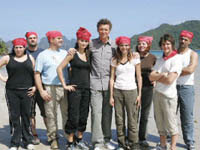 For more than 20 years the Philippine economy has been held to ransom by political bickering and a succession of failed coup attempts, but there are signs that this is now changing.
For more than 20 years the Philippine economy has been held to ransom by political bickering and a succession of failed coup attempts, but there are signs that this is now changing. The short-lived siege of a luxury Manila hotel by a group of soldiers on November 29 hardly made an impact on the economy with the stock market ending the day 1.2 percent higher.
The siege followed the assassination of a prominent Muslim congressman in a bomb blast outside the House of Representatives on November 13 and an accidental shopping mall explosion which killed 11 people on October 19.
In the past these events would have sent the economy into a tail spin. But the Economist Intelligence Unit recently forecast that economic growth in 2007 would hit 6.8 percent, the highest in 20 years.
Similarly the economy now seems unperturbed by constant corruption accusations against President Gloria Arroyo, who is determined to stay the course and end her term in 2010.
Although she has pardoned former president Joseph Estrada who was sentenced to life for corruption recently, a shadow will always hang over Arroyo and the seizure of power in 2001 when the military withdrew its support from the former movie actor.
Filipinos are tired of all the political bickering and military adventurism, said Nestor Aguila, president of DA Market Securities.
"These things are just seen as a nuisance today. Nobody cares about it," he added.
 The Philippine Business Leaders Forum, part of The Economist group, said in a recent commentary: "Growth is up, the budget deficit is down, the peso is going through the roof, remittances are at an all-time high in spite of the fall of the dollar and business confidence is booming."
The Philippine Business Leaders Forum, part of The Economist group, said in a recent commentary: "Growth is up, the budget deficit is down, the peso is going through the roof, remittances are at an all-time high in spite of the fall of the dollar and business confidence is booming."
James Lago, of Westlink Global Equities, said: "The Arroyo administration may have its problems but the local invstment community has come to terms with that. The fact is there is no solid alternative. "Despite rumblings against her the general public would rather live with the Arroyo administration," Lago said.
Even concerns over corruption no longer seem to be a deterrent to foreign investment. "The top countries in the world for foreign investment today are China and India and they have an extensive history of corruption," remarked John Forbes, director of the local American Chamber of Commerce.
It is in the area of economic reform, however, that business leaders still see problems. Forbes said that if the right reforms are implemented, the Philippines could see 35.8 billion dollars in new foreign investment from 2007 to 2010.
He identified 17 bills -- covering topics like customs brokerage, land administration and credit information -- that are ready to be passed into law and could help accelerate economic growth but which have largely been ignored by the legislature.
In a recent speech before the country's business community, Donald Dee, the usually soft-spoken chairman of the Philippine Chamber of Commerce and Industry, lashed out at the country's politicians.
"We are sick and tired of all these political noises. We are sick and tired or our leaders pointing their fingers at each other," he said. Although the economy still faces numerous challenges, such as rising oil prices, the weakening US dollar, continuing fiscal concerns and the possible effects of the US subprime credit crisis, it has still shown impressive growth in recent months.
The World Bank, in a report on Asia-Pacific economies, praised the Philippines as "the best performing economy among Southeast Asian middle income countries." "This indicates that (economic) growth for the year could reach or exceed 6.7 percent, which is on upper end of the government's target range for 2007," the World Bank said.
The economy's strength has been credited to the huge remittances of the millions of Filipinos working overseas, the booming business process outsourcing (BPO) sector at home, strong domestic demand and the resilience of the export industry. But business leaders have also identified other potential growth areas like tourism, mining, infrastructure, power and biofuels.
Article written by Mynardo Macaraig of AFP
Technorati Profile
Source: Good News Pilipinas





























